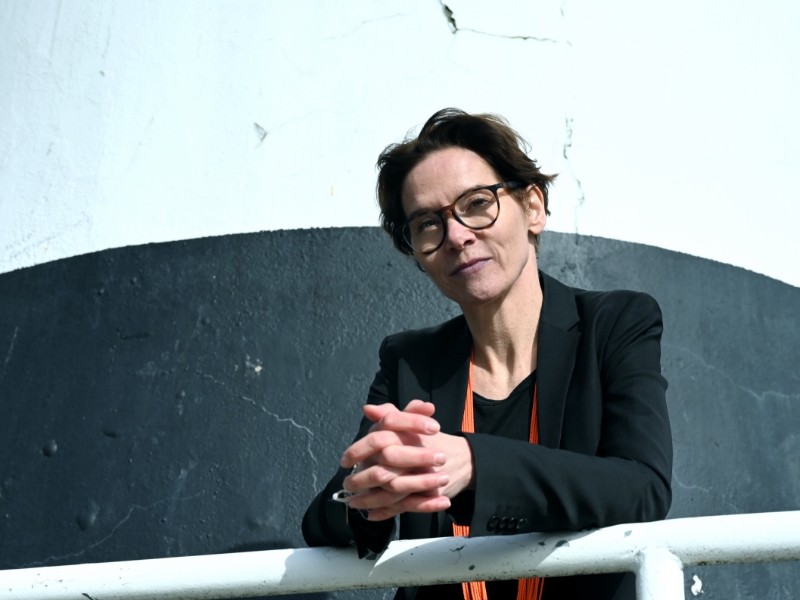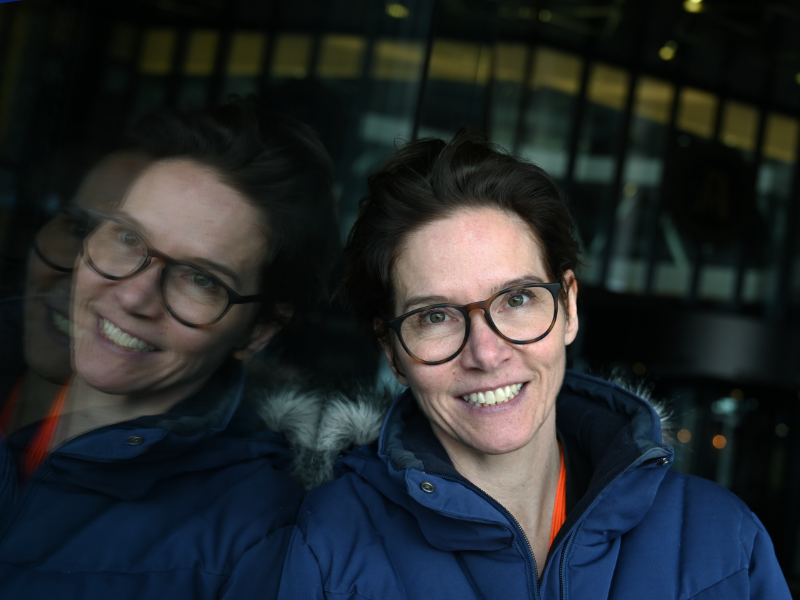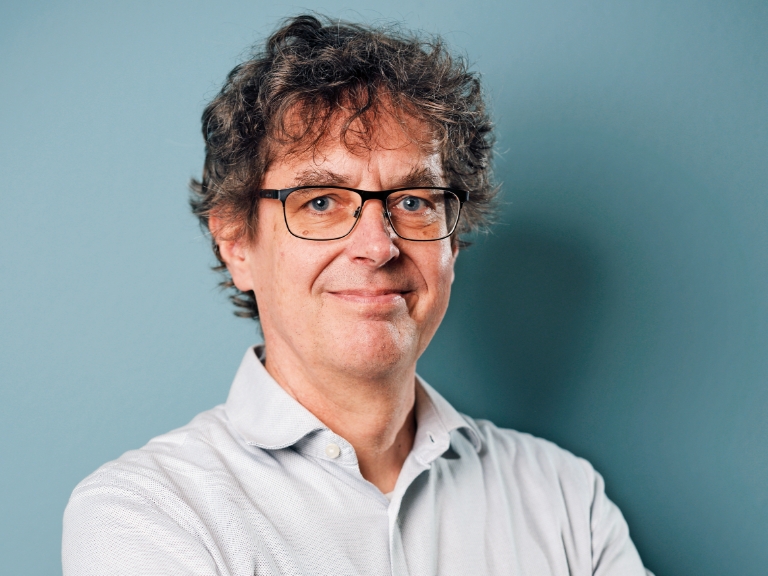Hans Sigrist Prize 2025
“We can’t expect judges to save us”
The Norwegian-German law professor, Christina Voigt, has been awarded the University of Bern’s Hans Sigrist Prize worth 100 000 Swiss Francs. This honor recognizes her achievements in advancing international climate law.

While Voigt’s career has been ambitious, it has not been straightforward. After completing her law degree in Passau, Germany, she joined a law firm in Regensburg where she successfully represented the personal interests of the firm’s clients. However, she soon realized that the work was not fulfilling enough for her and that she had far greater ambitions as a lawyer. Voigt yearned to do something for the common good. She then decided to pursue another degree in environmental law – a specialization that was not possible in Passau.
Luckily, the University of Auckland had been offering a master’s in environmental law since the beginning of the 2000s already, and so Voigt packed her bag and made her way halfway across the globe to New Zeeland. This decision came as a shock to her professional colleagues: "Christina, you're crazy to risk your professional future like that."
"My time as a student in Auckland was an epiphany."
At 30 she became a student again but reveals that her time in Auckland “was an epiphany”. She goes on to explain: "not only did I get to learn about a whole new area in law, but I also met committed people – lawyers who felt obligated to protect the environment and put a lot of thought into how the law could be used to protect it." Christina Voigt had found a field in which she felt she could tackle the big picture and decided to embark on an academic career. She resolved to write a doctoral thesis. "Do something about climate change," advised the supervisor of her master's thesis in Auckland, "this is a problem that will be with us for a long time."
Innovative legal research
Voigt took the advice of her supervisor to heart and started looking for possible doctoral positions. She found one at the University of Oslo in Norway and became an outstanding academic and policy advisor. Now the 53-year-old is being honored for her achievements with the Hans Sigrist Prize from the University of Bern. The jury praised her as an "exceptionally productive scientist" who has written "important and innovative work" on a wide range of topics.
According to the prizewinner herself, the most novel aspect of her research is probably how she examines which legal concepts have proven valuable in other contexts. These then need to be incorporated into climate discourse. However, according to Voigt, being innovative means, above all, "thinking ahead and considering in advance what challenges we will face as a global community and being ready to respond to them with different legal arguments."

This forward-thinking approach developed, in particular, due to Christina Voigt’s experience as a political consultant. She had requested Leave of Absence from the university to join the Norwegian Ministry of the Environment. Once again, her professional colleagues shook their heads in disbelief. "Christina, this will be the end of your academic career." But things turned out differently and Christina Voigt became Norway's legal negotiator at the international climate conferences. Returning to the university after three years at the Ministry of the Environment, she was finally appointed full professor of law at the University of Oslo in 2012.
Impressive list of publications
The Hans Sigrist Prize winner admits that she did not get the position of full professor because of her extensive practical experience as a negotiator, but rather because of her list of publications. "Your qualification is based on your academic output," she says, "and that's still the case today."
For Christina Voigt, publishing meant long nights and little sleep. After all, she could only devote herself to her academic work after her working day at the ministry - not to mention raising her two small children at the same time. "It wasn't easy, but I knew I had to do it. Not necessarily to build an academic career, but because I felt the need to tell a wider audience what was going on in climate negotiations, about the controversial issues and what possible solutions were conceivable."
“My students really appreciate the fact that I can impart how climate negotiations work in the real world.”
Her unique position between politics, international negotiations and research gives Christina Voigt exceptional credibility: "Looking back, this combination has been extremely helpful for both my research and teaching. Students really appreciate the fact that I can impart how climate negotiations work in the real world with a certain authenticity."
Exaggerated hopes for climate justice?
When it comes to climate law, Switzerland lags countries such as Norway, even though a corresponding chair is currently being established at the University of Bern. And when it comes to the legal aspects of climate protection, these are even less in the public eye than in law faculties.
It wasn’t until media made headlines of the lawsuit filed by the climate seniors (“KlimaSeniorinnen”) at the European Court of Human Rights in Strasbourg in 2024 – which led to a conviction against Switzerland – that the public became aware of the case. The specific consequences of the ruling for Swiss climate policy are still disputed. Were climate activists getting their hopes up too high when they celebrated the victory of the climate seniors? Is the actual impact of climate justice smaller than some assume?
Christina Voigt's answer is nuanced: "Climate lawsuits are a legitimate course of action, and all the pillars of a democratic system must be used to bring about change. However, I don't believe that lawsuits are the only solution. They should not, and cannot, play the leading role. We can't expect judges to save us if scientists and policy makers don't."
“It fills me with great joy to have been a part of something bigger.”
But climate change is such a complex challenge that we require "all hands on deck", including those of the judiciary. According to the Hans Sigrist Prize winner, legal arguments used in climate lawsuits are a set of tools. "The fact that this toolbox is now also being used in international courts, including the International Court of Justice in The Hague, gives me hope. And it fills me with great joy to have been a part of the development of these tools. It makes me feel like I have contributed to something bigger."
Just like another one of her commitments: Christina Voigt plays an important role at the International Union for Conservation of Nature (IUCN), a large NGO based in Gland on Lake Geneva. She has headed the IUCN's World Commission on Environmental Law – a global network of experts in environmental law and policy – since 2021. And as chief lawyer, Christina Voigt also represents the IUCN in court, as she did recently, for example, at the highest UN court, the International Court of Justice (ICJ) in The Hague.
About

Christina Voigt
Christina Voigt is a full professor at the University of Oslo, Norway. She is an expert in international environmental law, focusing on legal issues relating to climate change, biodiversity conservation, environmental multilateralism and sustainability. Christina Voigt is also a member—and was chair from 2019 to 2024—of the UN Expert Committee on Compliance with the Paris Agreement.
Climate law at the University of Bern
Legal aspects of climate protection are increasingly coming into focus at the University of Bern:
The Board of Trustees of the Hans Sigrist Foundation selects the prize field each year from proposals submitted by the faculties of the University of Bern. The prize is awarded in recognition of research achievements and to support future research projects. The prizewinners use the CHF 100,000 prize money to fund further research in the prize field. Two previous Hans Sigrist Prize winners have since been awarded the Nobel Prize.
in 2025, the Hans Sigrist Prize 2025 will be awarded in the field of climate law. Prize winner Christina Voigt will be presented on Friday, December 6, 2025, as part of the Hans Sigrist Symposium 2025. This year's symposium is being organized by the Oeschger Centre for Climate Research (OCCR) at the University of Bern. The Hans Sigrist Prize will then be presented at the Dies academicus of the University of Bern, which will take place this year on Saturday, December 6 at the Casino Bern.
Subscribe to the uniAKTUELL newsletter

Discover stories about the research at the University of Bern and the people behind it.


